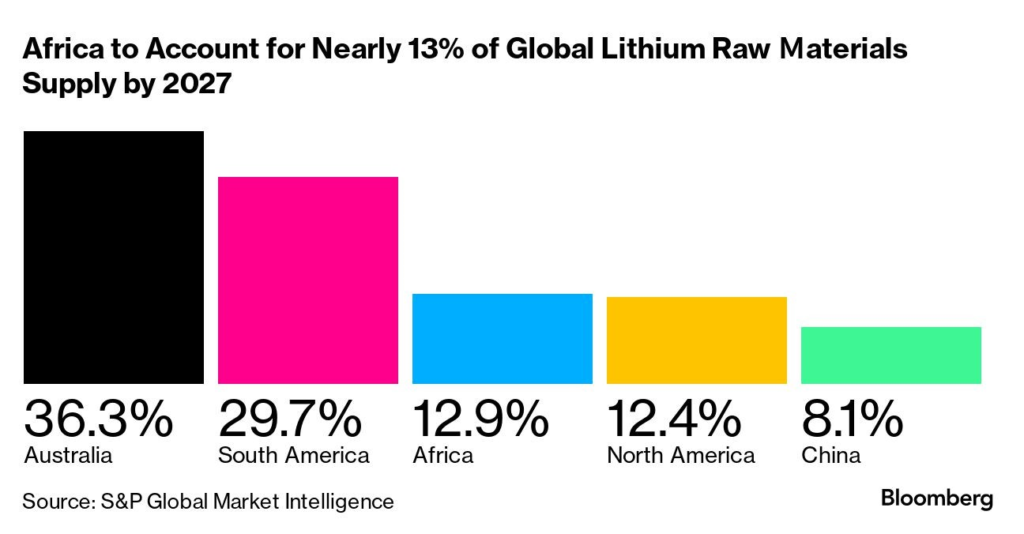Copycat Chinese lithium firms back Nigerian processing plant

Nigeria’s first lithium-processing plant launched to great fanfare this month with the backing of three companies that, at first glance, look a lot like heavyweights of China’s battery-metals industry.
But the trio of firms behind the planned $250 million investment — Ganfeng Lithium Industry Ltd., Tianqi Lithium Industrial Ltd. and Ningde Era Industrial Ltd. — have nothing to do with three nearly identically-named behemoths listed on the Shenzhen and Hong Kong stock exchanges. Instead, the West African country’s corporate register shows they are wholly local ventures controlled by Chinese nationals that were founded last year at an address in a medium-sized southwestern Nigerian town.
“We are independent companies,” Kelvin Dai, managing director of the Nigerian Ganfeng, said by text message. “Please don’t make any confusion,” he said, without answering questions on how and why the firm and its shareholders selected such recognizable names.
The project is a response to the Nigerian government’s efforts to diversify the economy away from oil and tap into a predicted explosion in electric-vehicle sales that has transformed lithium, a vital component in rechargeable batteries, into one of the world’s most important commodities.
It’s also the latest example of how the surging demand for lithium is prompting a frenzy of activity to secure fresh supplies by a range of new players like the recently established Nigerian companies — but also major automakers and specialist miners — looking to cash in on the boom.

‘No formal affiliation’
The Nigerian Ganfeng, which is owned by the Nigeria-based Tianqi and Ningde Era, hosted Solid Minerals Minister Dele Alake at a ceremony in the northern Nasarawa state on Oct. 12 to start building a facility the company says will take two years to complete and be able to refine 18,000 tons of lithium ore per day.
“My presence will provide moral support to deliver this project as fast as possible,” said Alake.
A week later, the Nigerian firm released a statement to the local media describing itself as a “renowned and reputable Chinese mining firm” that has “no formal affiliation whatsoever” with its much larger namesake. The company has “never relied on or utilized any resources or influence” of the more established group, it said. The statement didn’t refer to the names of its two shareholder firms.
A spokesperson for Jiangxi-based Ganfeng Lithium Group. Co. Ltd., which is one of the world’s largest suppliers of lithium chemicals, said in an email that the Nigeria-registered company is not one of its subsidiaries. Tianqi Lithium Corp. — one of China’s top producers of the metal — and Contemporary Amperex Technology Co. Ltd. — the world’s biggest manufacturer of EV batteries — also said they aren’t involved with the Nigerian firms. Ningde Era is the literal English translation from the Chinese characters of CATL, which is how the giant battery maker is known.
Alake didn’t respond to questions from Bloomberg about whether the Nigerian government was aware of the similarity of the names between the investors and the Chinese giants.
China leading race
Mines across Africa are forecast to increase lithium output more than 70-fold by 2030, compared with last year’s volume, according to BloombergNEF — which would grow Africa’s share of global supply to 14% from 1%.
China is leading the race to develop new sources of metal across the continent to help preserve its leading position in EV battery manufacturing, with countries including Zimbabwe, Mali and the Democratic Republic of Congo aiming to become significant producers. Western governments are now offering massive financial incentives to encourage domestic production and processing in a bid to make up ground on China.
Projects in Africa — those entering production and under development — are typically designed to export lithium concentrate, most of which is destined for China to be transformed into chemicals.
Alake has said that the new facility will manufacture full EV batteries — which would make it the first factory of its kind in Africa. The statement issued by the Nigerian Ganfeng said the company will make and sell lithium carbonate, a refined form of the metal used in EV batteries.
Nigeria has sizable untapped deposits of metals including gold, zinc, lithium and iron ore, but nearly all extraction is done by artisanal miners on a small-scale or manual basis. The exception so far is Toronto-listed Thor Explorations Ltd. which commissioned the country’s first industrial gold mine in late 2021 and has also acquired licenses to explore for lithium.
(By William Clowes and Annie Lee)
Read More: Nigeria to require mining firms to invest in domestic processing
{{ commodity.name }}
{{ post.title }}
{{ post.date }}




Comments